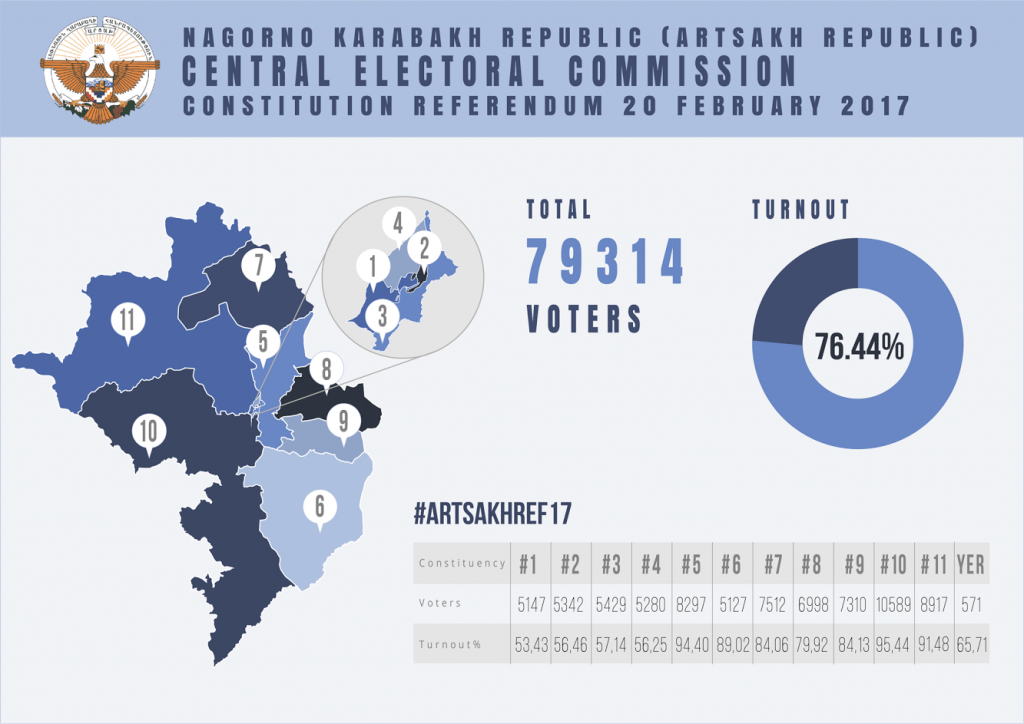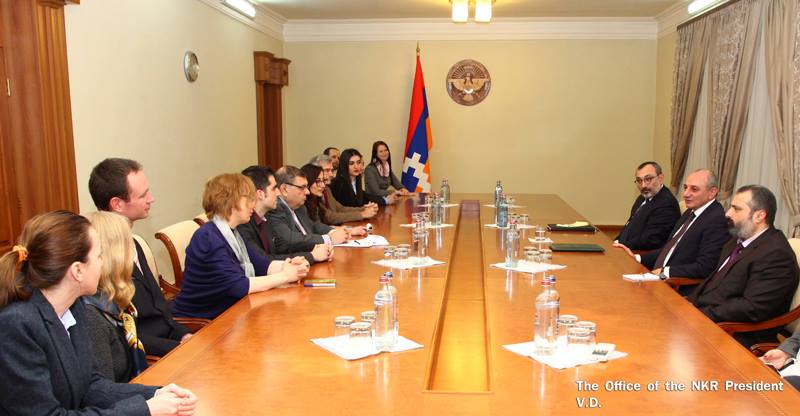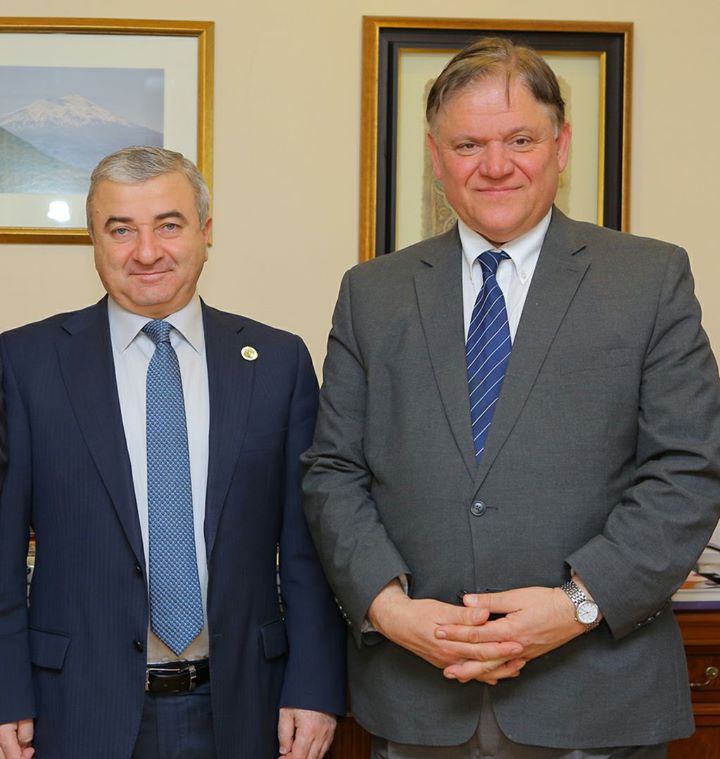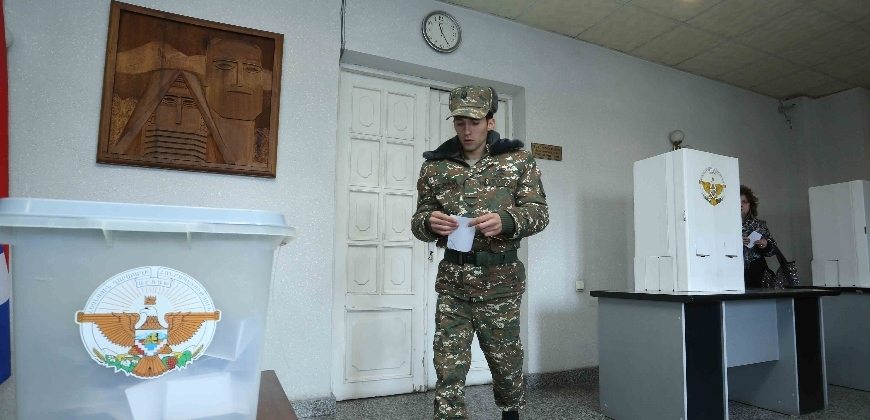‘The Republic of Artsakh’ Adopts New Constitution, Moves to a Fully-Presidential System of Government
STEPANAKERT, Artsakh— Following the constitutional referendum in the Nagorno-Karabagh Republic (NKR/Artsakh) on Feb. 20, the NKR Central Electoral Commission (CEC) announced on Feb. 21 that according to preliminary results 87.6% (69,540 votes) of citizens voted in favor of the proposed constitutional amendments, while 9.7% (7,686 votes) of votes were cast against. Invalid votes constituted about 2.8% (2,202 votes) of the total vote.
The NKR CEC added that 76.44% of eligible voters participated in the referendum.
The new constitution changes the official name of the Nagorno-Karabagh Republic to “The Republic of Artsakh” and will change the system of the country’s governance from a semi-presidential to fully-presidential system. Artsakh will have no longer have a Prime Minister and the President will appoint government ministers.
“The new Constitution is to continue the traditions of state building enshrined in the first constitution, further strengthen the sovereignty of the country, and promote human rights and the rule of law, to improve public administration, enroot the independent judiciary and reform the local self-government,” read the statement issued by the NKR Ministry of Foreign Affairs (MFA).
The NKR MFA also stated that the referendum shows that the people of Artsakh are able to “exercise their right in order to determine their own future, as enshrined in fundamental international documents.”

According to the NKR Central Electoral Commission, 76.44% of eligible voters participated in yesterday’s constitutional referendum. (Infographic: NKR Central Electoral Commission)
Observation missions to the referendum, which comprised of over 104 international organizations from more than 30 countries, 103 local observers, and over 80 media representatives, held a press conference on Feb. 21 in the hall of the Press Center of the NKR Referendum Central Commission.
During the press conference, representatives of the mission presented an evaluation of the election process and discussed its political significance. The press conference was joined by members of the European Parliament, the National Assembly of the Republic of Armenia, European Friends of Armenia, and the European Armenian Federation for Justice and Democracy (EAFJD), as well as delegation representatives from Bolivia, Russia, Germany, Austria, Uruguay, Mexico, Brazil, Argentina, the Basque Country, the United States, and Canada.
“The observers highly valued the Referendum as another evidence of consolidation of statehood, expression of free will of Artsakh and a process of democratization,” read the press release issued by the NKR CEC.

The European Armenian Federation for Justice and Democracy (EAFJD) led election observation delegation meet with Artsakh President Bako Sahakyan and his delegation (Photo: Office of the NKR President)
Members of the European Parliament Frank Engel, Eleni Theocharous and Jaromir Stetina also issued a joint statement on the referendum, which stated that the people of Artsakh want to actively play a role in shaping their democracy. The statement also praised citizens for upholding and protecting the rule of law and the rights of the people.
“A people, a population, a nation who believe in their state and refine their republican institutions should not be ignored by the international community,” read part of the statement. “The people of Artsakh, a nation under constant threat of military attack by an aggressive neighbor, continue to oppose democratic vitality and maturity to the international denial of their state.”
According to Azerbaijan-based reports, countries such as Pakistan, Latvia, Norway, Iran, Georgia, and Turkey joined Azerbaijan in rejecting the referendum, labelling it as an illegal vote.
Azerbaijani Foreign Ministry’s Official Representative Hikmet Hajiyev also told RIA Novosti that the Azerbaijani government will add all the foreign observers to their country’s blacklist.

Former Canadian parliamentarian, the Hon. Jim Karygiannis with the speaker of Artsakh’s parliament Ashot Ghoulyan, during his visit to observe the republic’s constitutional referendum (Photo: ANCC)
On Feb. 21, Artsakh President Bako Sahakyan received members of the delegations from the U.S., Russia, Canada, Germany, Argentina,and Uruguay consisting of parliamentarians, diplomats, political figures, representatives of scientific-research circles and civil society, as well as journalists, who were in Artsakh as observers.
“The Head of the State highlighted the importance of the observation mission carried out by foreign delegations from the viewpoints of consistent development of democratic institutions in our republic, presenting objective information about Artsakh in various countries and cementing bilateral relations,” read a statement released by the Central Information Department of the Office of the Artsakh Republic President.
Last week, the Co-Chairs of the Organization for Security and Cooperation in Europe (OSCE) Minsk Group released a statement that said that they would not accept the results of the Feb. 20 referendum “as affecting the legal status of Nagorno-Karabagh.” “The Co-Chairs also stress that the results in no way prejudge the final status of Nagorno-Karabagh or the outcome of the ongoing negotiations to bring a lasting and peaceful settlement to the Nagorno-Karabagh conflict,” read a part of the statement.
Source: Armenian Weekly
Link: Artsakh Votes for New Constitution, Officially Renames the Republic

